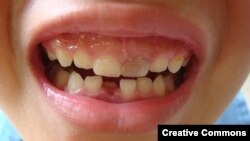Researchers have isolated stem cells from urine as the latest potential source of treatment for human diseases. Investigators say using urine to collect and cultivate these master cells is easy and involves minimal processing.
Using proteins known as growth factors, researchers can manipulate stem cells - or master cells - to grow into any tissue in the body. Therapy using stem cells from a patient’s own body is desirable because it does not cause immune rejection, as can happen with tissues and organs from donors.
Currently, most scientists use a complicated process to engineer regular skin and blood cells into specific cell types. That's because there are few pure sources of master cells - apart from human embryos, whose use is quite controversial.
Researchers are now finding small numbers of stem cells in urine. Anthony Atala, director of the Wake Forest Institute for Regenerative Medicine in Winston-Salem, North Carolina, said, “The advantage with urine is that you are getting approximately 2 liters of urine out every day. So you don’t have to keep going back and sticking the patient [with a needle] or doing biopsies on the patient.”
Reporting in the journal Stem Cells, a team from Wake Forest described how urine samples from 17 healthy individuals ranging in age from 5 to 75 contained stem cells that could be isolated, then coaxed to become smooth muscle-type cells like those that line the inside of the urethra and bladder.
Potential shown
Next, they placed the differentiated cells onto biologically-active support structures called scaffolds, made from pig intestine, then implanted the engineered tissue into mice.
After one month, the urine-derived stem cells developed biological markers of connective tissue and blood vessels, suggesting that they also had the potential to become bone, muscle, nerve or fat cells.
While urine may be a plentiful and less invasive way to obtain stem cells, some experts are skeptical about its value as a source of stem cells. Chris Mason, a regenerative medicine researcher at University College London, said there are very few usable stem cells in the liquid waste.
But he said in a Skype interview that the unusual research into urine-derived stem cells needs further scientific exploration.
“It looks like it’s an area where we are looking at very, very early data from a few groups. And I think that before we can say for certain there are [usable stem cells in urine], one would have to have it reproduced by a number of different laboratories. So I think it’s more of a question mark and a maybe, rather than a certainty and a definitely not,” said Mason.
Researchers in China, meanwhile, report having grown tiny tooth buds from master cells found in urine. Researchers caution it is not yet clear, however, whether those buds can take root and grow into replacement teeth.
Using proteins known as growth factors, researchers can manipulate stem cells - or master cells - to grow into any tissue in the body. Therapy using stem cells from a patient’s own body is desirable because it does not cause immune rejection, as can happen with tissues and organs from donors.
Currently, most scientists use a complicated process to engineer regular skin and blood cells into specific cell types. That's because there are few pure sources of master cells - apart from human embryos, whose use is quite controversial.
Researchers are now finding small numbers of stem cells in urine. Anthony Atala, director of the Wake Forest Institute for Regenerative Medicine in Winston-Salem, North Carolina, said, “The advantage with urine is that you are getting approximately 2 liters of urine out every day. So you don’t have to keep going back and sticking the patient [with a needle] or doing biopsies on the patient.”
Reporting in the journal Stem Cells, a team from Wake Forest described how urine samples from 17 healthy individuals ranging in age from 5 to 75 contained stem cells that could be isolated, then coaxed to become smooth muscle-type cells like those that line the inside of the urethra and bladder.
Potential shown
Next, they placed the differentiated cells onto biologically-active support structures called scaffolds, made from pig intestine, then implanted the engineered tissue into mice.
After one month, the urine-derived stem cells developed biological markers of connective tissue and blood vessels, suggesting that they also had the potential to become bone, muscle, nerve or fat cells.
While urine may be a plentiful and less invasive way to obtain stem cells, some experts are skeptical about its value as a source of stem cells. Chris Mason, a regenerative medicine researcher at University College London, said there are very few usable stem cells in the liquid waste.
But he said in a Skype interview that the unusual research into urine-derived stem cells needs further scientific exploration.
“It looks like it’s an area where we are looking at very, very early data from a few groups. And I think that before we can say for certain there are [usable stem cells in urine], one would have to have it reproduced by a number of different laboratories. So I think it’s more of a question mark and a maybe, rather than a certainty and a definitely not,” said Mason.
Researchers in China, meanwhile, report having grown tiny tooth buds from master cells found in urine. Researchers caution it is not yet clear, however, whether those buds can take root and grow into replacement teeth.




